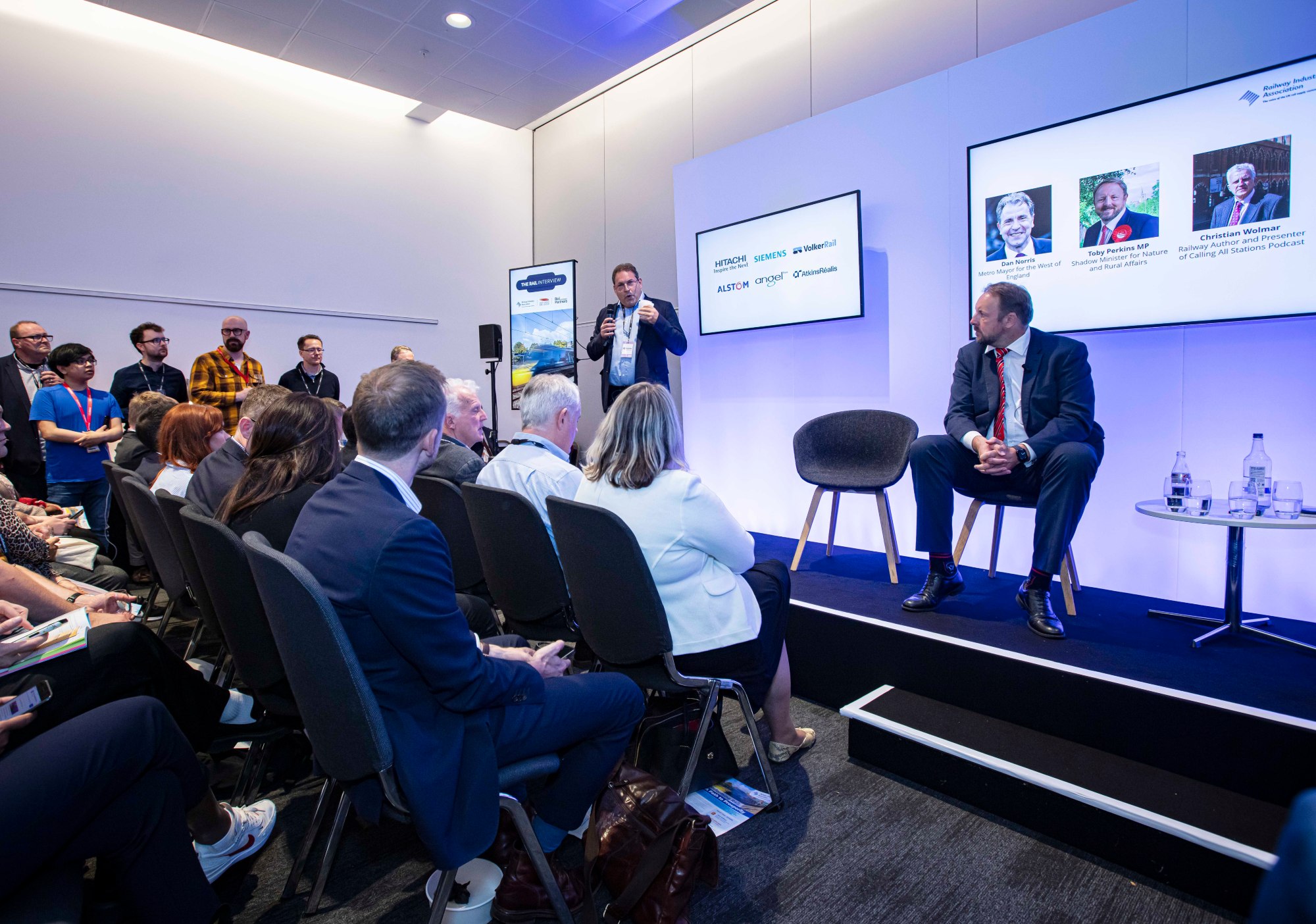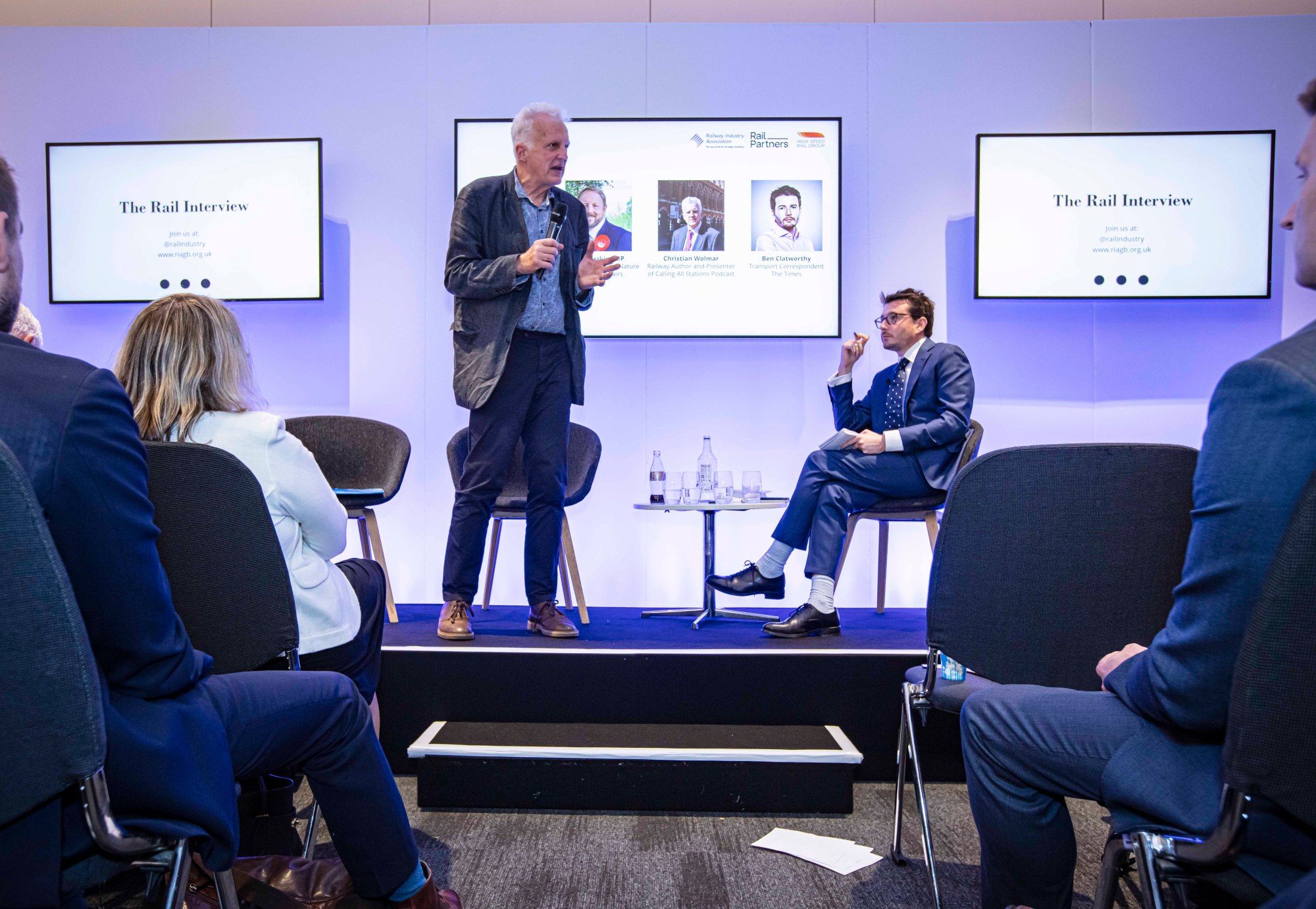Labour Party Conference event: Delivering a rail infrastructure fit for the future
Toby Perkins MP, with Ben Clatworthy from The Times
The future of the UK’s rail network has dominated the agenda across this year’s party conference season. As all parties revisit their plans for the future shape of rail, PoliticsHome joined experts at the Labour Party Conference to learn more about the challenges ahead for the UK rail network and how these can be addressed.
Future investment in rail has been a major theme of this party conference season. One of the defining announcements at the Conservative Party Conference was the decision to scrap Phase 2 of HS2, between Birmingham and Manchester.
A Railway Industry Association (RIA) event at the Labour Party Conference provided an opportunity for a range of industry experts to come together for the first time following the HS2 announcement. It was a chance to reflect on the future, not just around high-speed rail but across a range of critical issues affecting the network.
Colette Carroll, Market Director for Strategic Rail at AtkinsRéalis, and a member of the RIA Board, set the context for the discussion by reminding attendees of the critically important role that infrastructure plays in driving growth.
“We don't work on infrastructure because we like infrastructure,” Carroll explained. “We work on infrastructure because of what it brings to society and what it brings to the economy. We need to make sure that the railways are invested in to be able to give communities and the economy what they need.”
Economic Impact
Carroll’s theme was taken up by RIA Chief Executive, Darren Caplan. He explained how a reformed railway can be a cornerstone for economic growth, jobs, and productivity in communities and regions across the UK.
“Rail brings £43 billion in gross value added to the economy each year, supports 710,000 jobs, and generates £14 billion in tax revenue for the Treasury,” he told attendees.
But Caplan also cautioned that – with the UK population set to exceed 70 million by 2040 and healthy and growing rail passenger numbers post-pandemic – further investment is urgently needed. That investment will only be unlocked if the industry is given the policy certainty required to plan effectively, something that has been shaken by recent announcements.
“It is a really positive sector but the key thing we need is certainty,” Caplan said. “We need to know what the future holds.”
 RIA Chief Executive, Darren Caplan, speaking at the event
RIA Chief Executive, Darren Caplan, speaking at the event
HS2 Phase 2 Cancellation
Understandably, the recent decision to abandon large parts of the HS2 project was the subject of much discussion.
Labour MP, and a Shadow Environment Minister, Toby Perkins has been a longtime advocate for the scheme which was originally intended to pass through his Chesterfield constituency. He told Ben Clatworthy, Transport Correspondent at The Times, that the decision to axe Phase 2 of the project meant that areas like his would now miss out on economic growth.
“I am genuinely really upset as a constituency MP who has been banging the drum for HS2 for 13 years,” Perkins said. “It's so depressing that something that has enjoyed cross-party consensus, that was the most significant investment in rail since Victorian times, has been canned on a whim.”
Darren Caplan acknowledged that politicians and industry insiders need to take time to understand the impact of the decision and to plot an alternative way forward. However, he urged politicians present to “keep the flame alive” on HS2 Phase 2, and ensure that if future public finances allowed there was still the option to revisit the project.
Industry Reform
The event also zeroed in on the wider need for industry reform to enable the truly long-term approach needed for the net zero transition and to meet the demands of growing passenger numbers.
Speakers suggested that central to that is the need to more closely integrate oversight of track and train operations to improve the experience of customers and reduce costs for the taxpayer. RIA itself has consistently argued that the nation needs a long-term strategy for rail that supports bringing industry costs and revenues together.
Shaping Future Policy
Christian Wolmar, a leading writer on the transport industry, responded to the interview and also shared his personal views on the importance of long-term integration for the future success of the industry. He told Ben Clatworthy that now is the time for the Opposition to set out its plans boldly and clearly.
“I do think, that with six months, nine months, a year to go before the General Election, now is the time for Labour to start setting out some genuine positive policies about rail,” he explained. “I think they need to start with a real sense that we believe in rail and set out an agenda that means that rail is going to grow.”
For Wolmar, that debate has to be wide-ranging and challenge the current orthodoxy of private franchising as the dominant operating model.
“My view is that franchising doesn't work,” he told the event. “Do you have to give everything to the private sector to operate? We didn't in the past. Various services have been taken back in house. They seem to work better.”
 Christian Wolmar on stage with Ben Clatworthy from The Times
Christian Wolmar on stage with Ben Clatworthy from The Times
Improving Customer Experience
And beyond issues of ownership, Wolmar also argued more needs to be done to address the issues that impact on passengers the most. Chief amongst these is addressing the cost of rail travel and reforming a ticketing system that many customers find bewildering.
“If we want to get more people on the railways then we absolutely have to talk about fares,” he explained. “We haven’t talked about fares yet, but boy are they important. Nobody understands the fare system and, yes, we've got to keep the ticket offices open and we've got to keep Wi-Fi on trains. We have to make the whole experience more pleasant.”
Wolmar cited the experience in Scotland where peak fares have been temporarily abolished as an example of bold thinking that has struck a chord with rail users. He called for politicians south of the border to show similar imagination when determining future policy.
Conclusion
Malcolm Brown, CEO of rolling stock company Angel Trains, provided the closing remarks for the event. He reminded people that changing plans for HS2 created an immediate and direct impact not just on his own business, but on many others that were now regrouping and revising their plans.
But like many of the speakers, his main plea was for politicians from all parties to provide the long-term clarity that will enable businesses like his to plan and invest.
“We provide economic, social, and environmental benefits,” he said. “But the one thing we have all agreed today is that we need a clear vision for rail.”
